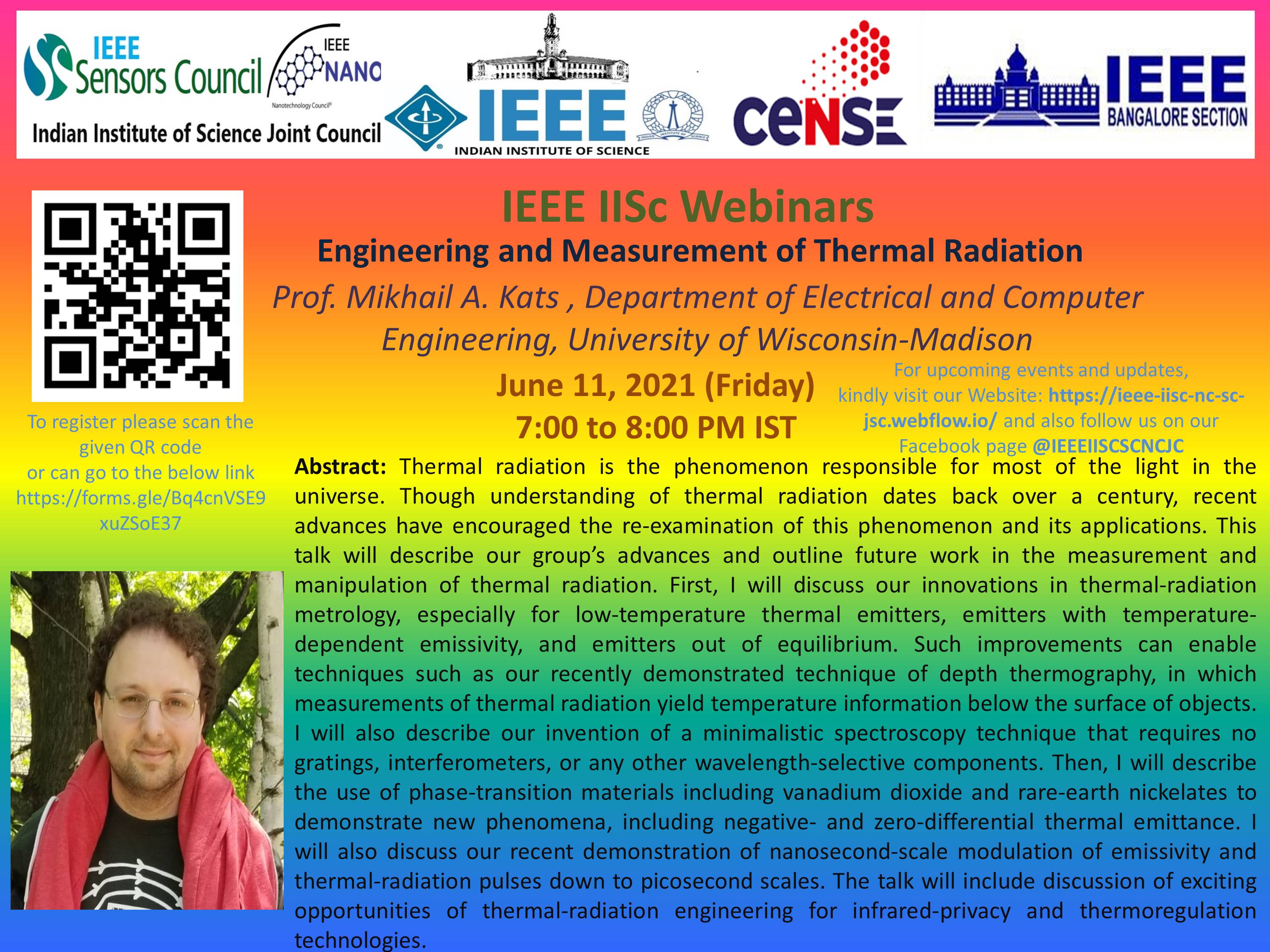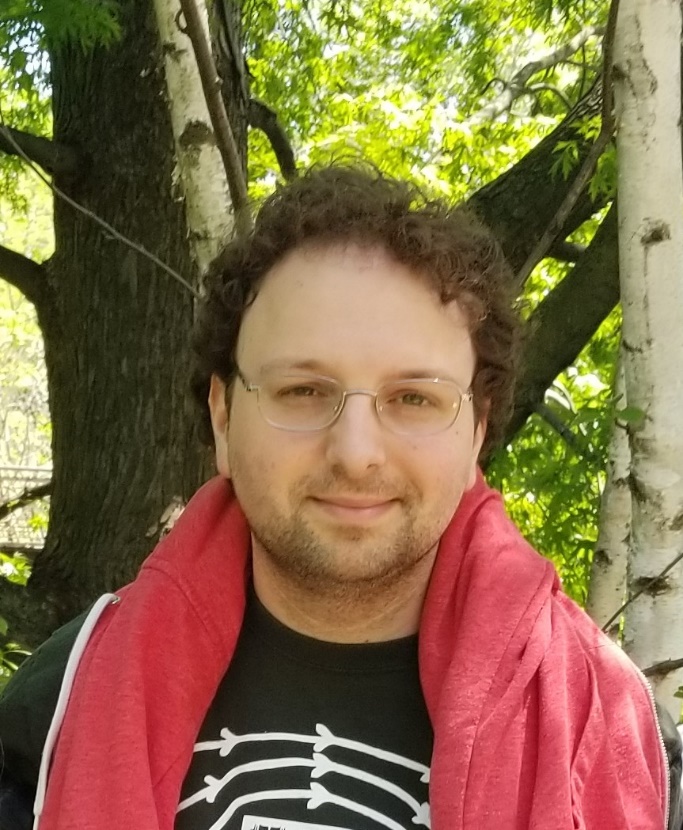Engineering and measurement of thermal radiation

Thermal radiation is the phenomenon responsible for most of the light in the universe. Though understanding of thermal radiation dates back over a century, recent advances have encouraged the re-examination of this phenomenon and its applications. This talk will describe our group’s advances and outline future work in the measurement and manipulation of thermal radiation. First, I will discuss our innovations in thermal-radiation metrology, especially for low-temperature thermal emitters, emitters with temperature-dependent emissivity, and emitters out of equilibrium. Such improvements can enable techniques such as our recently demonstrated technique of depth thermography, in which measurements of thermal radiation yield temperature information below the surface of objects. I will also describe our invention of a minimalistic spectroscopy technique that requires no gratings, interferometers, or any other wavelength-selective components. Then, I will describe the use of phase-transition materials including vanadium dioxide and rare-earth nickelates to demonstrate new phenomena, including negative- and zero-differential thermal emittance. I will also discuss our recent demonstration of nanosecond-scale modulation of emissivity and thermal-radiation pulses down to picosecond scales. The talk will include discussion of exciting opportunities of thermal-radiation engineering for infrared-privacy and thermoregulation technologies.
Date and Time
Location
Hosts
Registration
-
 Add Event to Calendar
Add Event to Calendar
Speakers
 Prof. Mikhail A. Kats of University of Wisconsin-Madison
Prof. Mikhail A. Kats of University of Wisconsin-Madison
Engineering and Measurement of Thermal Radiation
Thermal radiation is the phenomenon responsible for most of the light in the universe. Though understanding of thermal radiation dates back over a century, recent advances have encouraged the re-examination of this phenomenon and its applications. This talk will describe our group’s advances and outline future work in the measurement and manipulation of thermal radiation. First, I will discuss our innovations in thermal-radiation metrology, especially for low-temperature thermal emitters, emitters with temperature-dependent emissivity, and emitters out of equilibrium. Such improvements can enable techniques such as our recently demonstrated technique of depth thermography, in which measurements of thermal radiation yield temperature information below the surface of objects. I will also describe our invention of a minimalistic spectroscopy technique that requires no gratings, interferometers, or any other wavelength-selective components. Then, I will describe the use of phase-transition materials including vanadium dioxide and rare-earth nickelates to demonstrate new phenomena, including negative- and zero-differential thermal emittance. I will also discuss our recent demonstration of nanosecond-scale modulation of emissivity and thermal-radiation pulses down to picosecond scales. The talk will include discussion of exciting opportunities of thermal-radiation engineering for infrared-privacy and thermoregulation technologies.
Biography:
Mikhail Kats is Jack St. Clair Kilby Associate Professor at the Department of Electrical and Computer Engineering at University of Wisconsin-Madison, with affiliate appointments in the Departments of Physics and Materials Science and Engineering, as well as the Wisconsin Energy Institute, the Wisconsin Quantum Institute, and the McPherson Eye Research Institute. Mikhail’s research interests include optical properties of engineered materials, novel optical and optoelectronic devices, tailoring of thermal radiation and radiative heat transfer, and related topics in optics and photonics. Prior to joining UW-Madison, he received his BS in Engineering Physics from Cornell University in 2008, and his PhD in Applied Physics from Harvard University in 2014. In 2018 and 2019, he was identified by Web of Science as a Highly Cited Researcher. His recognitions include the ONR Young Investigator Award, the AFOSR Young Investigator Award, and the NSF CAREER award, the IEEE Photonics Society Young Investigator Award, the IEEE Nanotechnology Council Early Career Award, as well as selections to the Forbes “30 Under 30” and ASEE Prism’s “20 Under 40” lists.
Address:United States
Agenda
Thermal radiation is the phenomenon responsible for most of the light in the universe. Though understanding of thermal radiation dates back over a century, recent advances have encouraged the re-examination of this phenomenon and its applications. This talk will describe our group’s advances and outline future work in the measurement and manipulation of thermal radiation. First, I will discuss our innovations in thermal-radiation metrology, especially for low-temperature thermal emitters, emitters with temperature-dependent emissivity, and emitters out of equilibrium. Such improvements can enable techniques such as our recently demonstrated technique of depth thermography, in which measurements of thermal radiation yield temperature information below the surface of objects. I will also describe our invention of a minimalistic spectroscopy technique that requires no gratings, interferometers, or any other wavelength-selective components. Then, I will describe the use of phase-transition materials including vanadium dioxide and rare-earth nickelates to demonstrate new phenomena, including negative- and zero-differential thermal emittance. I will also discuss our recent demonstration of nanosecond-scale modulation of emissivity and thermal-radiation pulses down to picosecond scales. The talk will include discussion of exciting opportunities of thermal-radiation engineering for infrared-privacy and thermoregulation technologies.

